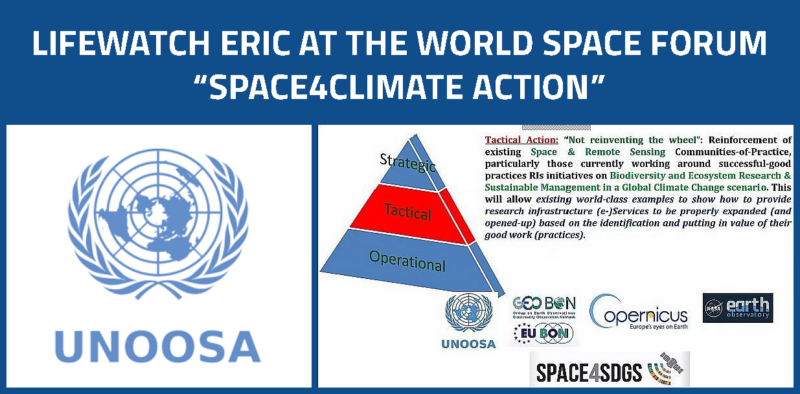
Yesterday, during the second day of the 2021 World Space Forum “Space4Climate Action” organised by UNOOSA (the United Nations Office for Outer Space Affairs), LifeWatch ERIC CTO, Dr Juan Miguel González-Aranda, presented “Towards the establishment of a global e-Biodiversity network for Sustainable Development Goal accomplishment and Ecosystem Services provision”. Dr González-Aranda highlighted that humanity is bringing our life support system, the biosphere, to the point of collapse, proposing that to solve this situation we must deepen our current level of knowledge, move beyond the present fragmentation of science, and foster greater complementarity and synergy between disciplines. One of the ways to do this being the development of new trans-disciplinary paradigms and the building of synthetic knowledge, with the aim of boosting innovation and a great involvement of young scientists and civil society.
LifeWatch ERIC is Europe’s first line of response to the biodiversity emergency, applying state-of-the-art ICT (Remote Sensing, Big Data, HPC-Cloud-Edge Computing, Blockchain, AI-Machine Learning, IoT-Sensor Networks, etc.) and services to scientific Communities-of-Practice and research centres all over the world through its distributed e-Infrastructure. It engages with and interconnects Researchers, Technologists, Decision-makers, Environmental Managers, Companies, Entrepreneurs, and Citizen Scientists, helping these stakeholders to develop their activities into Virtual Research Environments (VREs). This demonstrates the added value which ICT brings to battling “The Big Five” significant causes of biodiversity loss (changing use of sea and land, direct exploitation of organisms, climate change, pollution and invasive non-native species), contributing significantly to the introduction of the appropriate measures to combat them. LifeWatch ERIC is particularly involved, for instance, in Aichi Target 9, regarding Non-indigenous and Invasive species.
These activities are being carried out in synergy with the UN SDGs (in particular, 15: Life on Land and 14: Life on Water), the EU Biodiversity Strategy for 2030, the European Green Deal, and many more. This is in addition to the essential role of the forthcoming Global Europe instrument (as often cited in ongoing EU-CELAC and EU-African Union cooperation) in relation to indigenous knowledge. The recognition of the importance of indigenous knowledge in reversing biodiversity loss is further reflected in the recent creation of IKRI (the Indigenous Knowledge Research Infrastructure) where key outcomes are anticipated in cooperation with prominent stakeholders, including UNOOSA, ITU (The UN International Telecommunications Union) and LifeWatch ERIC.
You can see the full programme here.